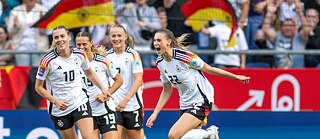From July 2 to 27, Switzerland will host the 14th UEFA Women’s European Championship. How to still get tickets, what’s inside the ball, and who might win the title — we’ve got all the answers right here.
All matches live on free TV
In Germany, everyone basically has a subscription to the Women’s Euro — all 31 matches will be broadcast by public service broadcasters ARD and ZDF. The first two group matches for Germany — on July 4 at 9 p.m. CET (3 p.m. EST) against Poland and on July 8 at 6 p.m. CET (12 p.m. EST) against Denmark — will air on ARD. The third game, on July 12 at 9 p.m. CET (3 p.m. EST) against Sweden, will be shown on ZDF. A clear advantage over the men’s World Cup next year, where a MagentaTV subscription will be required to watch all matches live.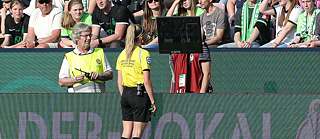
Football is also watched on the pitch - although it's usually scenes for review. | © picture alliance / foto2press | Oliver Baumgart
Germany holds the record for most titles
The German team has won an impressive eight (!) of the 13 European Championships held so far. If you count West Germany’s 1989 victory, the tally even rises to nine. From 1995 on, the DFB women’s team showed total dominance, winning six (!) consecutive championships. It wasn’t until 2017 (since 1997 the tournament has taken place every four years) that Germany lost the title — to the Netherlands.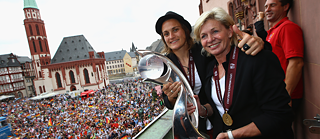
Goalkeeper Nadine Angerer and national coach Silvia Neid with the trophy on the balcony of Frankfurt's Römer after the German women's national football team's last European Championship victory in 2013 | © picture alliance / Sven Simon | Poolfoto/SVEN SIMON
High-tech ball
Footballs are no longer just leather and air. “Konektis,” the official match ball of the tournament, even has an inner life: it contains “Connected Ball Technology,” being used for the first time in a Women’s Euro. The system sends precise data to the video assistant referees (VAR), helping match officials make quicker decisions. The ball is designed to detect every touch, speeding up calls on handballs and penalties. Still, the most important rule remains: the ball must hit the back of the net.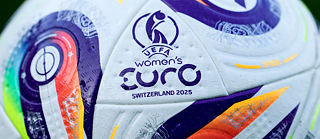
The official match ball of the European Championship 2025: nobody should be able to outsmart its technology | © picture alliance / foto2press | Oliver Zimmermann
Mascot Maddli
What the dachshund is to Germany, the Saint Bernard is to Switzerland — naturally, the tournament’s mascot is a Saint Bernard puppy. Its name, “Maddli,” also has a story: it’s inspired by Madeleine Boll, the first licensed female footballer in Swiss history. In 1965, she even played a match with the junior boys’ team of FC Sion against Galatasaray Istanbul — because the official in charge mistook her for a boy. Maddli stands for fair play, kindness, and loyalty — and proudly wears jersey number 25.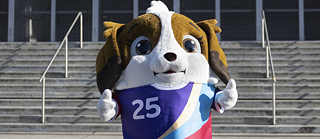
Maddli, the official mascot of the European Women's Championship 2025 | © picture alliance/KEYSTONE | PETER KLAUNZER
Tickets still available!
You read that right — the Women’s Euro hasn’t completely sold out yet. Tickets for Germany’s matches are gone, but the official UEFA ticket shop still has seats for several group stage games — starting at the equivalent of just €27. Even the quarterfinal between the winner of Group A and the runner-up of Group B is still open for live viewing in the stadium. And with a bit of luck, the resale portal might offer tickets to sold-out matches.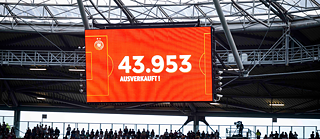
Even if the German matches are sold out - as here recently in Hanover: Tickets are still available for some Euros matches | © picture alliance / Kirchner-Media | David Inderlied
Who will win the Euros?
If you knew for sure, you could make a fortune. What’s certain is that Germany isn’t going into the tournament as the top favorite. The group — with Poland, Denmark, and Sweden — isn’t exactly a “group of death,” but it’s no cakewalk either. A potential quarterfinal would likely see them face a very strong team from Group D — probably England, France, or the Netherlands. Spain is expected to field the strongest squad — their players recently won the Nations League.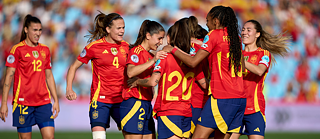
The top favourites for the title: the Spanish women's national football team | © picture alliance / NurPhoto | Jose Manuel Alvarez Rey
At high altitude
Playing at Ottmar Hitzfeld Stadium requires some serious acclimatization. The pitch, located over 2,000 meters above sea level in the Swiss Alps, is considered the highest football stadium in Europe. It’s home to the amateur club FC Gspon — but no Euro matches will be played there. Still, it’s not too far from the nearest tournament venue: just 60 kilometers (and 1,500 vertical meters) away from Stade de Tourbillon in Sion.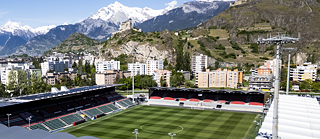
Impressive scenery: The Stade de Tourbillon in Sion | © picture alliance/KEYSTONE | JEAN-CHRISTOPHE BOTT
Grüezi, Bonjour, Ciao and Allegra!
These are just a few ways to say hello in Switzerland, a country with four national languages: Swiss German, French, Italian, and Romansh. In 17 of the 26 cantons, German is the only official language. French is mainly spoken in the west, Italian in the south. Romansh is only an official language in the canton of Graubünden — and today, only a few tens of thousands still speak it.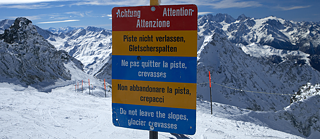
Attention, multilingualism ahead! In Switzerland, you can put your language skills to use like hardly anywhere else | © picture alliance / Caro | Ruffer
Two newcomers
While record-holders Sweden have never missed a Women’s Euro, Poland and Wales will be making their tournament debut this year. All other teams also took part in the 2022 edition. Can the newcomers shake things up? Despite Poland and Wales ranking only 28th and 31st on the FIFA world rankings, they shouldn’t be underestimated. FIFA’s number one, the USA, won’t be competing — for obvious reasons: it’s a European championship.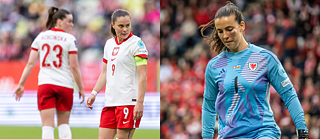
The Polish team led by captain Ewa Pajor and the Welsh team led by goalkeeper Olivia Clarke are taking part in the Women's European Championship for the first time. | © picture alliance / Action Plus | Foto Olimpik; ©picture alliance / Gonzales Photo/Nicolai Bethelsen | Gonzales Photo/Nicolai Bethelsen
From Basel to Basel
This time, the “Miracle of Bern” won’t be repeated — at least not in the final. The stadium where the German men unexpectedly won their first World Cup title in 1954 with a 3:2 against Hungary will host four matches this summer. But the two most prestigious games — the opening match and the final — will take place in Basel’s St. Jakob-Park. With a capacity of over 38,000, it’s also the largest football stadium in Switzerland.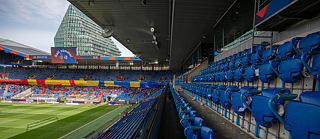
FC Basel matches are normally played here, but in summer St. Jakob-Park is the venue for the Women's European Championship. | © picture alliance / ZUMAPRESS.com | Priscila Bütler
Nicknames
This year’s Euro is going wild — literally: the “Three Lionesses” and the “Oranje Leeuwinnen” (Orange Lionesses) will both be competing for the title. These are the nicknames of the English and Dutch teams, respectively. If you’re facing the “Helmarit” (Eurasian eagle-owls), you’re up against Finland. By contrast, the German team’s name is rather plain: they go simply by “DFB-Frauenteam” — the DFB women’s team.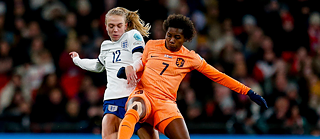
‘Three lionesses’ against ‘orange lionesses’: Esme Morgan (England) and Lineth Beerensteyn (Netherlands) fighting for the ball. | © picture alliance / Sipa USA | Focus Images
06/2025
